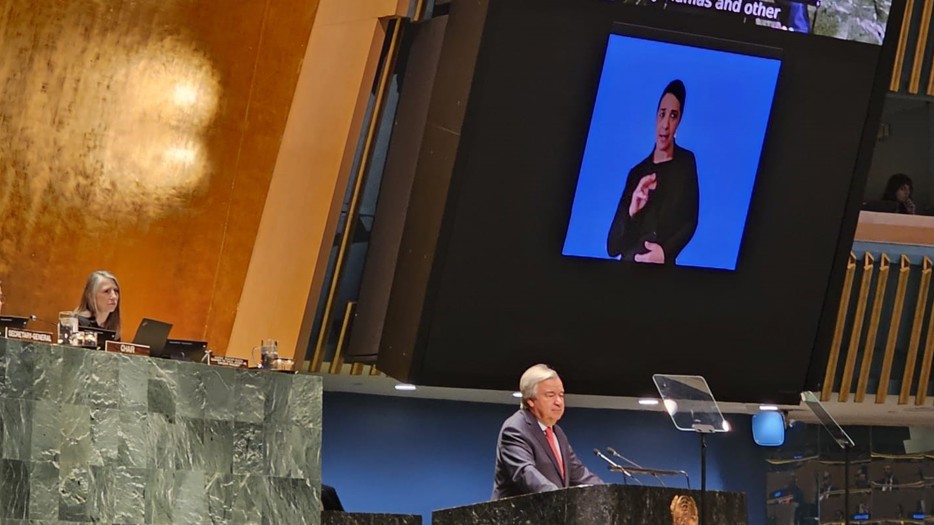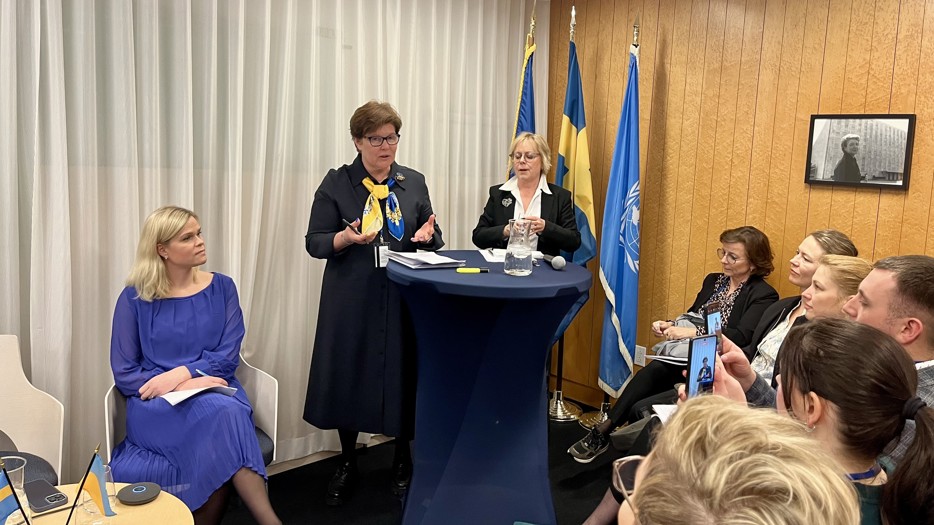Conflicts and poverty dominated this year’s Commission on the Status of Women
War, gender-blind AI and an unequal distribution of power and resources are all factors that contribute to increased gender inequality, UN Secretary-General António Guterres asserted in his opening speech at this year's Commission on the Status of Women, CSW68. Also, the annual session was affected by the on-going global crises and the organised opposition against gender equality.

"Accelerating the achievement of gender equality and the empowerment of all women and girls by addressing poverty and strengthening institutions and financing with a gender perspective". This was the overall theme of the CSW 2024, 11-22 March.
Globally one out of ten women is facing extreme poverty. Also in Sweden the relative poverty increases, which mainly affects women and children. The present situation with increasing wars and conflicts around the world, gender inequality and poverty increase further.
Small steps forward
After five days of negotiations and despite geopolitical tensions the Commission managed to reach concsensus on Agreed Conclusions. Sweden was part of the European Union's negotiations team together with Cyprus, Ireland and Hungary and the EU Delegation.
Like all UN negotiations on gender equality in recent years, a lot of time was spent on debating which terminology to use. All intersectional language met with resistance, and the debate on sexual and reproductive health and rights and related issues such as comprehensive sexuality education continues to be contentious. Even wording on family is disputed.
One area of progresses is that the Agreed Conclusions contain new language about both paid and unpaid domestic work and provision of care – as a women's trap - and new references to "the care economy". In addition, recommendations on universal access to health services and writings wording emphasising the role of men and boys in gender equality work can be noted.
Sweden's side event highlighted trafficking in human beings
Alongside the official negotiations, a number of so called side events were organised. Economic equality and men's violence against women are highly prioritised in the Swedish foreign policy and in international development cooperation. Relating to this year's theme of the CSW, Sweden chose to highlight human trafficking for sexual exploitation in its official side event, which was organised together with Ukraine.
Since long we know that trafficking in human beings thrives in conflict areas, where poor or refugee women and children are exploited for sexual exploitation. According to UNODC (United Nations Office on Drugs and Crime), the number of Ukrainian victims of trafficking in human beings quadrupled two years after Russia's annexation of the Crimean Peninsula. UNODC therefore assesses that the risk of exploitation will increase the longer the war continues. The event focused on the need for increased detection of victims of trafficking in human beings, protection and support for the vulnerable survivors and the need to work to reduce demand.

Lack of framework and resources to counter trafficking in human beings
To start with, government representatives from Sweden, Ukraine, Poland, and Moldova took part in the opening panel, followed by a panel of experts represented by civil society, survivors and the UN Special Rapporteur on human trafficking. Government representatives for Ukraine as well as Poland and Moldova emphasised the need for financing as well as the role of civil society in combating trafficking in human beings, and at the same time pointed to the urgent need for stronger institutions to be able to deal with the problem.
Moldova's Minister of Social Security, Alexei Buzu, reported on cases where pregnant 11-year-old girls fell through the safety net and were ignored by both the school, the police and social services.
The UN's special rapporteur for human trafficking, Siobhán Mullally, pointed out in her latest report to the UN General Assembly that international conventions often lack specific references to trafficking in human beings.
Paulina Brandberg, Minister of Gender Equality in Sweden, highlighted Sweden’s Sex Purchase Act as the single most important factor contributing to reduced demand for women in prostitution in Sweden.
About the CSW
The Commission on the Status of Women (CSW) is a functional commission of the United Nations Economic and Social Council (ECOSOC) and the largest annual UN event promoting gender equality and the empowerment of women.
Every year the CSW brings together tens of thousands of participants: government representatives, civil society organisations, experts and decision makers in the field.
The session is held over two weeks in March at the UN headquarters in New York and includes panel discussions, seminars, multilateral meetings, discussion forums and negotiations.
Publication date: 26 March 2024
Last updated: 13 June 2024
